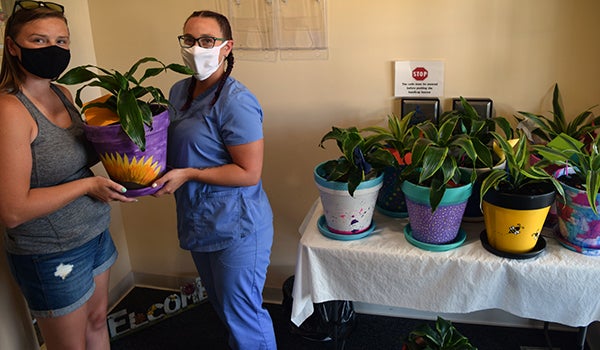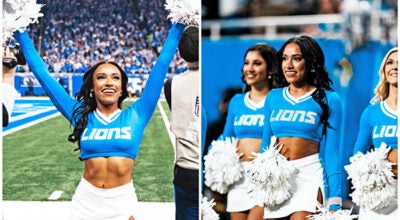Virtual camp immerses SMC ETS in community service
Published 2:05 pm Thursday, July 30, 2020
|
Getting your Trinity Audio player ready...
|
DOWAGIAC — Shay Krick might be expected to identify hunger as the gravest problem as Feeding America West Michigan program coordinator.
However, she believes hunger is a symptom of a larger issue.
“I believe poverty is the biggest social problem we have as a community,” she said. “It affects minorities disproportionately. All other social justice issues that are important to me — water security, voting rights, women’s rights, systemic racism — have their roots in poverty. Until we take a deep look at that, I personally don’t believe we can make a lot of headway.”
Southwestern Michigan College Educational Talent Search’s virtual summer camp, goLEAD (Leadership, Education and Development), brought middle and high schoolers together online three afternoons a week July 6-24.
Participants included Makayla Dopkowski, Loren Bowen and sisters Jossalyn and Alayna Rogalski of Dowagiac, Alivia Colley of Marcellus and four Edwardsburg students, Jaelyn Carlos, siblings Amy and Ossian Duckworth of Niles and Arabella Van’t Hof of Niles.
Via Zoom, they explored service learning, from creating posters depicting their notions of utopia to picking the brains of non-profit professionals such as Krick in a July 10 panel discussion.
Michigan State University Extension educators guided participants through how to become strong leaders aware of their own potential, communication and leadership styles.
Krick’s Grand Rapids-area food bank is the largest of six in Michigan, responsible for feeding 40 of the state’s 83 counties.
“Pantries are where people in need of assistance get food,” Krick said. “Food banks supply pantries with products. I’ve been with Feeding America West Michigan for five years, working directly with agency partners. We work with United Way and the Humane Society. We feed half a million families per year, from Cass/Berrien/Van Buren counties to Cadillac and the Upper Peninsula.”
Debbie Ramirez, United Way of Southwest Michigan volunteer engagement director, and Xay Somsanith, Humane Society of Southwestern Michigan fundraising/marketing coordinator, flanked Krick as panelists.
Ramirez joined United Way seven months ago, bringing 25 years of experience in the volunteer realm. She managed volunteers at Whirlpool Corp. for 10 years during its Habitat for Humanity partnership. Right out of Michigan State Ramirez worked in Orlando with Walt Disney World employee volunteers.
“United Way works with communities on underlying causes of local issues, be it food insecurity, financial stability, health or education,” Ramirez related. “In the five months since COVID hit, I’ve been astounded by young people helping by mobilizing pods of their friends and family to help society through this, whether it’s writing cards to seniors or delivering food. Volunteering is going to be bigger and better in the future.”
“The most successful programming comes from your heart,” Krick added. “We had an 8-year-old boy who collected change for his birthday and purchased a mobile food pantry to feed 100 families. It doesn’t have to be big and loud to count. Every little thing adds up. You don’t have to change the world on a major scale to make a difference.”
Somsanith, who joined the Humane Society 11 months ago, left Whirlpool in 2017 after eight years. The Humane Society was established in 1934 as the Berrien County Society for the Prevention of Cruelty to Animals.
“Animals can be expensive, from dog and cat food and supplies to vet bills. If you can’t feed yourself, can you afford to take care of an animal?” Somsanith asked. “We can turn something negative like the pandemic into new things. When it seems bleak, non-profits see opportunities.”
An exercise ranking 15 items in a stranded vehicle during a blizzard teaches more than problem-solving or wilderness survival. Its larger lesson is consensus-building through gradients of agreement. Better decisions result from group discussions, though it takes longer.
The importance of asking questions was driven home July 17 by Sara Keinath, who studied forestry at Michigan Technological University, then served as a Peace Corps volunteer in Nepal for three years.
Well-meaning people go to unfamiliar locales and fail to sufficiently pose questions to pinpoint needs. Growing mushrooms, a non-timber forest product, supplanted tree aspirations “because it was important to them and I wanted to be relevant. That’s a big concept to understand when you’re trying to help others,” Keinath said.
Project possibilities were evaluated by criteria of whether it addressed an issue they cared about, met a real community need and allowed enough time to complete in a compressed time frame while making a measurable impact.
GoLEAD July 22 painted 10 big pots they planted with dracaena, decorated with pinwheels and delivered with handwritten cards to Dowagiac’s Forest Glen Assisted Living.
“The project’s outcome matters,” facilitator Jackie Martin said, “but the process you go through also matters a great deal to us so you can apply it to future projects.”
ETS summer camps continue Aug. 10-14 with Future Entrepreneurs of Southwest Michigan.







